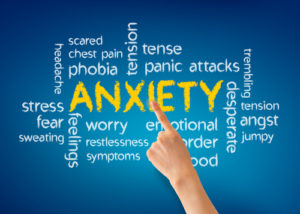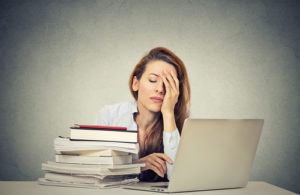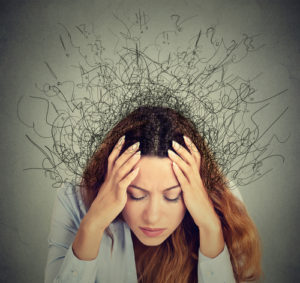Back to Mental Health Page
Back to Student Counselling
What is Anxiety?

Occasional Anxiety is a normal part of life. You might feel anxious when faced with problems at college, before exams, presentations or making important decisions about life. Anxiety Disorders are more than a temporary worry. For people who have anxiety disorders, their worry or anxiety does not go away and can get progressively worse over time.
Anxiety is a fear or feeling of unease, which can be mild or severe. These feelings can affect daily activities such as college performance and relationships.
There are different types of anxiety disorders such as Generalised Anxiety Disorder, Panic Disorder and Social Anxiety Disorder. (NIMH, 2016)
Statistics relating to Anxiety
- 1 in 6 students are diagnosed with/ treated for anxiety.
- 22% of students say that Anxiety has affected their academic performance in the last 6 months.
- 54% of students have felt overwhelming anxiety in the past 12 months.
Signs & Symptoms:
Psychological Symptoms of Anxiety
- Restlessness.
- A sense of dread.
- Feeling constantly on edge.
- Difficulty concentrating.
- Irritability.
- Impatience.
- Being easily distracted.
Physical symptoms of Anxiety
- Drowsiness.

- Irregular heart beat.
- Excessive sweating.
- Difficulty falling or staying asleep (insomnia).
- Stomach aches.
- Diarrhoea.
- Pins and needles.
- Muscle aches and tension.
- Dry mouth.
Social symptoms of Anxiety
- Not doing well at college/school.
- Taking part in fewer social activities.
- Having difficulties in your home and family life.
- Avoiding contact with friends.
- Neglecting your hobbies and interests.
Panic Disorder
Those who experience Panic Disorder have frequent unexpected Panic Attacks which are incidents of extreme fear including palpitations, increased heart rate, increased breathing, sweating, shaking, shortness of breath, and feelings of not being able to breathe.
Signs & Symptoms:
- Attacks of intense fear
- Feelings of being out of control during a Panic Attack
- Worries about the next Panic Attack
- Fear of places where a Panic Attack occurred previously (NIMH, 2016).
People in the midst of a panic attack may feel they are having a heart attack or in extreme cases even feel as if they are dying. Panic attacks are intensely frightening, upsetting and deeply uncomfortable but, they are not dangerous.
Social Anxiety Disorder
Social Anxiety Disorder (SAD) is a form of anxiety disorder that involves individuals experiencing anxiety in some or all of their social interactions. It involves having a fear of social or performance situations where the person anticipates feeling embarrassed, judged or rejected by others (SocialAnxietyDisorder, 2017)
Signs & Symptoms
- Feeling anxious about socialising with people.
- Feeling very self-conscious in front of other people and worried about feeling embarrassed.
- Blushing, sweating, or trembling around other people.
- Afraid that other people will judge you.
- Worrying about events where other people will be days or weeks before they happen.
- Avoiding places where people will be.
- Struggling to make friends and keep friends.
- Feeling nauseous or sick when other people are around (NIMH, 2016).
Causes of Anxiety
Why you are feeling anxious may not always be clear. Usually anxiety is caused by a range of factors all coming together in a person’s life at one time, these may include the following:
- A major stressful incident

- Your body’s biological processes
- Illness
- Family History
- Alcohol / Drugs
- Abuse
- Your environment (social)
- Loneliness
Tips to help you manage Anxiety;
There are lots of things you can do to help manage Anxiety symptoms;
- Physical activity – being physically active for 30 minutes per day improves mood and releases endorphins into the brain making you happier and more resilient. getirelandactive.ie
- Mindfulness – tuning into the present moment and becoming aware of your feelings and your thoughts. You can download mindfulness apps to your phone.
- Diet – Diet can significantly impact your mood, aim to avoid caffeine and sugary foods and drinks, as they can increase feelings of anxiousness (NIMH, 2016).
What negatively contributes to Anxiety?
- Smoking, Alcohol and Drugs; can make anxious feelings worse. You may have a tendency to drink alcohol and smoke more when you are feeling anxious and feel this temporarily helps. It does in fact exacerbate feelings of anxiety (NIMH, 2016).
- Cannabis;has been linked with mental health problems such as anxiety as well as depression and schizophrenia, frequent use of cannabis has been linked to high rates of anxiety and paranoia (Patton, 2002)
Where can I get support for Anxiety?
In the college, the student counsellor, nurse and doctor can all be contacted at the student health services in the Institute of Technology, Sligo.
Contact the Student Counselling Service at IT Sligo on:
- Email: studentcounsellor@nullitsligo.ie, or
- Phone: 071 9305463
Contact the Student Health Service at IT Sligo on:
- Phone: 071 93 05205 or
- Email: studenthealthservices@nullitsligo.ie
